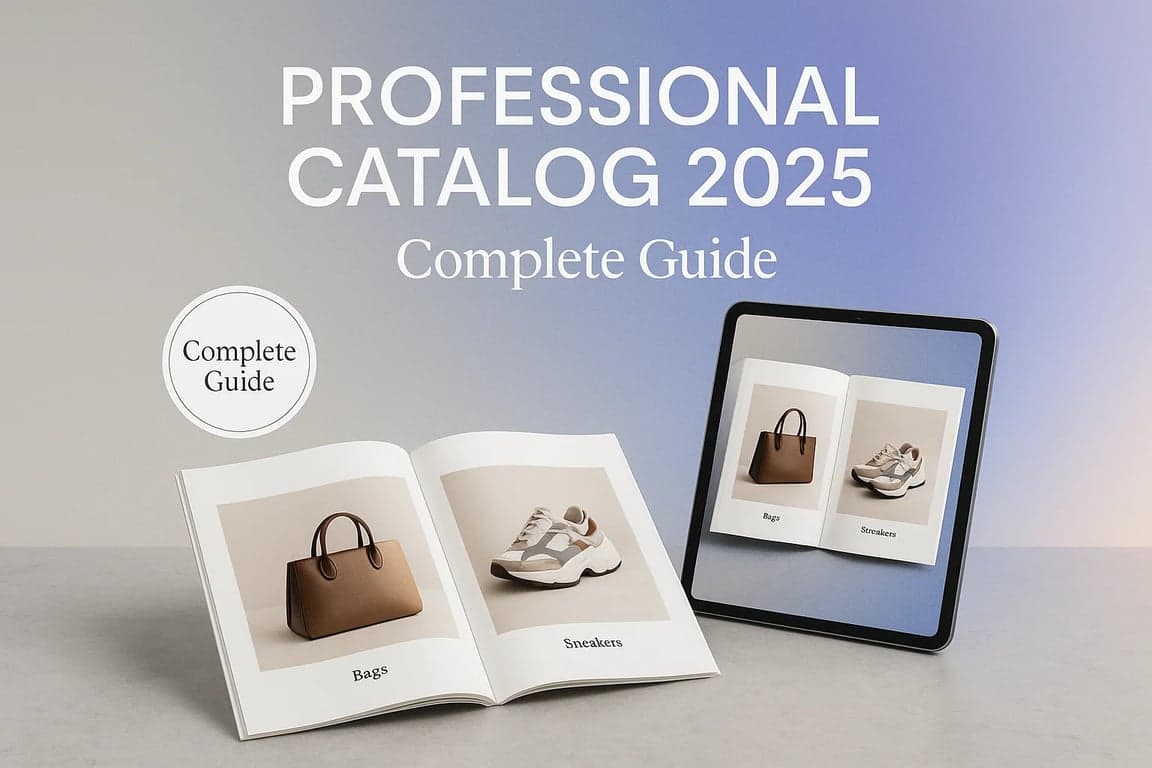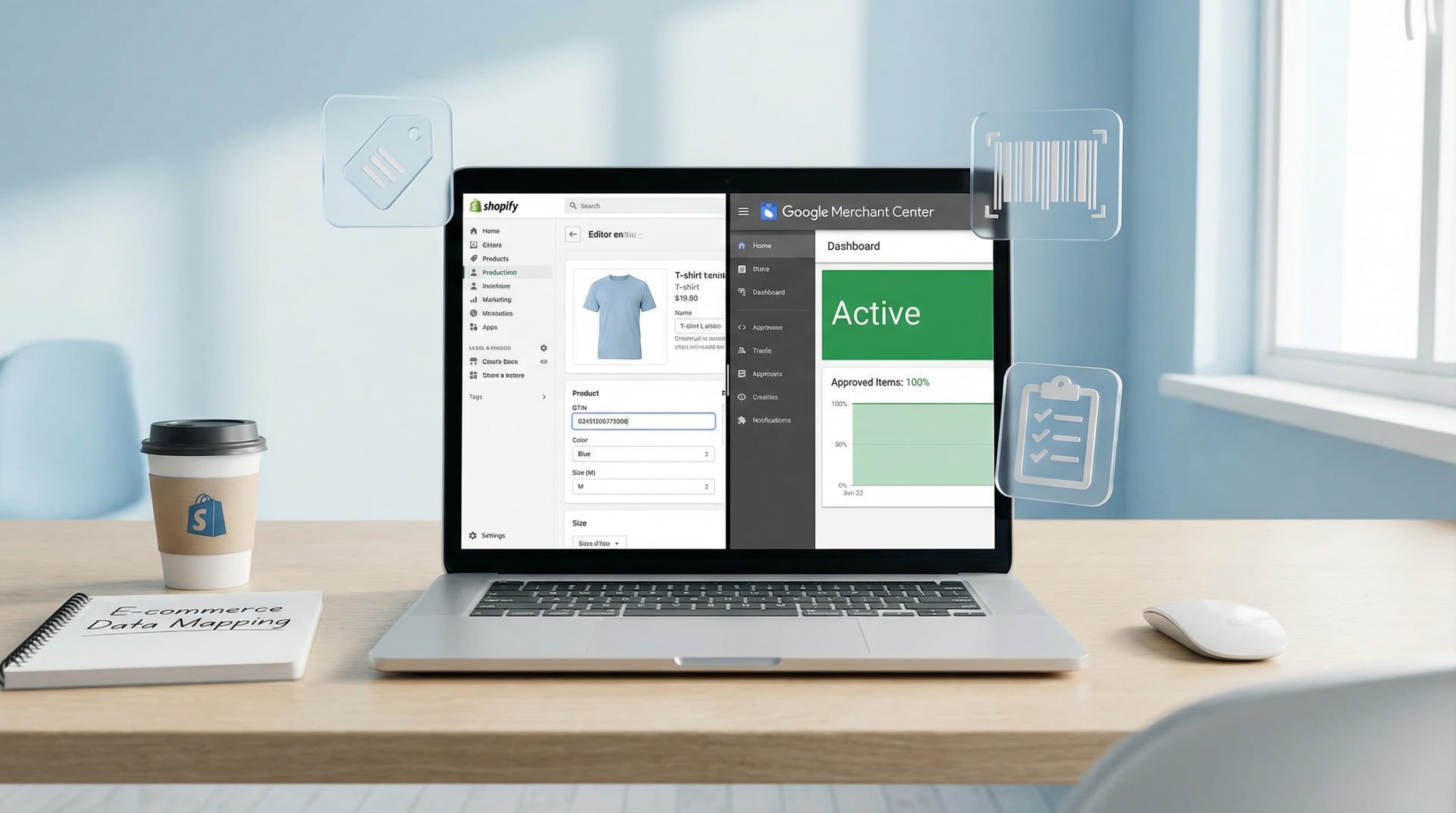📊 Impactful fact: 93% of consumers consider visual appearance the most important factor in purchase decisions, and a professional catalog can increase sales by up to 127%.
Create Product Catalog: Complete Guide 2025 | ButterflAI
Learn how to create a professional product catalog. Discover the best tools, costs, and strategies for WhatsApp and online sales.

Transform your business with product catalogs that actually sell
Introduction: Why Your Business Needs a Professional Product Catalog
In today's competitive e-commerce world, creating an effective product catalog is the difference between success and failure. A well-designed catalog doesn't just showcase your products—it tells a story, builds trust, and converts visitors into loyal customers. According to recent studies, companies with professional catalogs experience a 67% increase in conversion rates compared to those using simple product listings.
Catalog creation has evolved dramatically. While it previously required large investments in design and printing, today artificial intelligence tools like ButterflAI allow you to create professional catalogs in minutes, automatically optimizing images, removing backgrounds, and applying design best practices. This technological revolution democratizes access to professional-quality catalogs for businesses of all sizes.
How to Create a Successful Product Catalog? Step-by-Step Methodology
Creating an effective product catalog requires a structured methodology that combines strategy, design, and technology. Here's the complete process used by the most successful brands:
1. Strategic Planning and Goal Definition
Before designing, clearly define your catalog's purpose. Are you looking to inform, promote, or sell directly? Identify your target audience and the key message you want to convey. This phase determines your entire subsequent approach: a WhatsApp catalog will have different characteristics than one for commercial presentations or online stores.
Tip:
- Define 3 specific objectives for your catalog
- Create detailed buyer personas of your audience
- Establish measurable KPIs (conversions, viewing time, etc.)
- Determine available budget for photography and design
2. Product Information Gathering and Organization
Gather all essential details for each product: commercial name, compelling description, competitive pricing, relevant technical specifications, product codes, and unique benefits. Information must be accurate, updated, and oriented toward resolving potential customer doubts. Organize this information in a structured database for easy future use.
Tip:
- Create a standard template for product information
- Include relevant keywords in descriptions
- Highlight benefits, not just features
- Maintain consistency in tone and writing style
3. Professional Photography and Visual Optimization
Images are the heart of your catalog. Invest in professional photography or use tools like ButterflAI to automatically improve the quality of your existing photos. AI can remove backgrounds, improve lighting, adjust colors, and create uniform compositions that give visual coherence to your entire catalog.
Tip:
- Use natural lighting or professional studio setup
- Maintain consistency in angles and composition
- Include multiple product views (front, side, detail)
- Automatically optimize with AI for different formats
4. Professional Design and Layout
Select a design that reflects your brand's visual identity. Group products into logical categories to facilitate navigation and use clear visual hierarchies. The design should be clean, professional, and optimized for the final format (digital, print, WhatsApp). Use pre-designed templates or AI tools that automatically apply design best practices.
Tip:
- Maintain white space to avoid visual overload
- Use readable typography and clear hierarchies
- Apply colors consistent with your brand identity
- Include clear and attractive calls-to-action
5. Strategic Publishing and Distribution
Decide on the final format according to your strategy: interactive digital catalog, mobile-optimized PDF, online store integration, or printed physical catalog. For WhatsApp, create optimized versions with reduced file size and vertical format. Consider multiple distribution channels to maximize reach.
Tip:
- Generate multiple formats from the same base design
- Optimize for SEO if it's a web catalog
- Include contact information and ordering methods
- Plan regular content updates
Best Tools for Creating Product Catalogs in 2025
Choosing the right tool determines the efficiency and quality of the final result. Here are the most effective options based on different needs and budgets:
🚀 ButterflAI - The AI Revolution (Advanced AI)
Specialized in e-commerce products, ButterflAI uses artificial intelligence to automatically optimize images, remove backgrounds, enhance quality, and generate professional catalogs in minutes. Ideal for companies that need to process large volumes of products.
From $30/month
🎨 Canva - Easy and Accessible (Easy to Use)
Intuitive interface with pre-designed templates and simple design tools. Perfect for small businesses or entrepreneurs who need to create catalogs quickly without advanced technical knowledge.
From $12/month
🏆 Adobe InDesign - Professional (Professional)
Industry standard for professional editorial design. Offers complete control over design, typography, and layout, but requires graphic design experience for optimal results.
$23/month
📱 Flipsnack - Interactive Catalogs (Interactive)
Specialized in digital catalogs with page-turning effects and interactive elements. Ideal for commercial presentations and online catalogs that need additional engagement.
From $16/month
🛍️ Shopify - E-commerce Integrated (E-commerce)
Complete platform that integrates catalog with online store. Perfect for businesses that want to sell directly from the catalog and manage inventory automatically.
From $35/month
💬 WhatsApp Business - Direct and Effective (Free)
Catalog integrated directly into WhatsApp Business. Allows customers to view products, prices, and place orders without leaving the app. Ideal for direct sales and personalized attention.
Free
Real Costs of Creating a Product Catalog: Investment vs Return
One of the most frequent questions is: how much does it cost to design a product catalog? The answer depends on the approach, tools, and level of professionalism desired. Here's a detailed analysis of costs and ROI:
Cost Comparison: DIY vs Professional vs AI
Detailed analysis of investment and return according to different approaches
DIY Approach (Do It Yourself)
Tools: Canva, PowerPoint, free GIMP. Time: 20-40 hours. Skills: Basic design. Result: Functional but basic catalog. Advantages: Low initial cost, total control. Disadvantages: Considerable time, amateur result.
Total Cost: $60-180
AI Approach (ButterflAI)
Tools: ButterflAI + complementary tools. Time: 3-8 hours. Skills: Minimal. Result: Professional automated catalog. Advantages: Speed, professional quality, scalability. Disadvantages: Monthly cost.
Total Cost: $90-300
ROI Analysis by Approach
- DIY: 200-300% ROI in 6 months, but requires a lot of time
- AI: 400-600% ROI in 3 months, greater scalability
- Professional: 300-500% ROI in 4 months, maximum quality
- Hybrid: Combines AI + professional touches, 500-700% ROI
Investment in AI like ButterflAI has proven to be the most profitable option for most businesses. It reduces production times by 85%, maintains professional quality, and allows constant updates without significant additional costs.
Digital Catalogs for WhatsApp: The Strategy Revolutionizing Sales
WhatsApp has become a crucial platform for e-commerce, especially in Spanish-speaking markets. Creating a digital catalog for WhatsApp requires specific considerations that maximize mobile experience and facilitate direct sales.
1. WhatsApp Business Setup
WhatsApp Business offers an integrated catalog feature that allows displaying up to 500 products directly in the app. This functionality is free and allows customers to view products, prices, and make inquiries without leaving WhatsApp.
Tip:
- Complete all business profile fields
- Set up automatic responses for frequent inquiries
- Organize products into clear categories
- Include shipping information and payment methods
2. Mobile Optimization
WhatsApp catalogs must be optimized for mobile viewing. This means high-quality images with reduced file size, readable text on small screens, and vertical design that takes advantage of smartphones' natural format.
Tip:
- Use vertical format (9:16) for better viewing
- Keep PDF files under 5MB for easy sending
- Include large, visible prices
- Use contrasting colors to highlight key information
3. Distribution Strategy
Implement a distribution strategy that includes automatic sending to contact lists, social media integration, and personalized follow-up. Use tools like ButterflAI to automatically generate versions optimized for each channel.
Tip:
- Create specific versions for different segments
- Include QR codes for easy catalog access
- Integrate with CRM systems for tracking
- Measure engagement and conversions by channel
Common Mistakes When Creating Product Catalogs (And How to Avoid Them)
Learning from the most common mistakes can save you time, money, and frustration. Here are the main errors we see in product catalogs and how to avoid them:
❌ Low Quality or Inconsistent Images
- Problem: Using photos taken with different lighting, angles, or resolutions creates an unprofessional image.
- Solution: Use tools like ButterflAI to automatically standardize all images: same lighting, uniform backgrounds, and professional quality.
❌ Information Overload
- Problem: Including too much technical or descriptive information makes the catalog difficult to read and navigate.
- Solution: Prioritize benefits over features. U...
FAQs
Quick answers to common questions.
Latest posts

How to Configure Facebook and Instagram Catalog from Shopify with Clean Data
Learn how to map variants, use metafields, and audit errors for a flawless product feed in Meta Commerce Manager.
Jan 15, 2026

Google Shopping Attributes: Mapping Guide for Shopify and Merchant Center
Master the Google Merchant Center feed: a guide to mapping variants, Shopify metafields, and identifiers to maximize visibility.
Jan 14, 2026

Product Datasheet Template for eCommerce: Guide and Data Model
Practical guide to structuring your catalog data, optimizing Shopify mapping, and preparing your store for AI scaling.
Jan 12, 2026